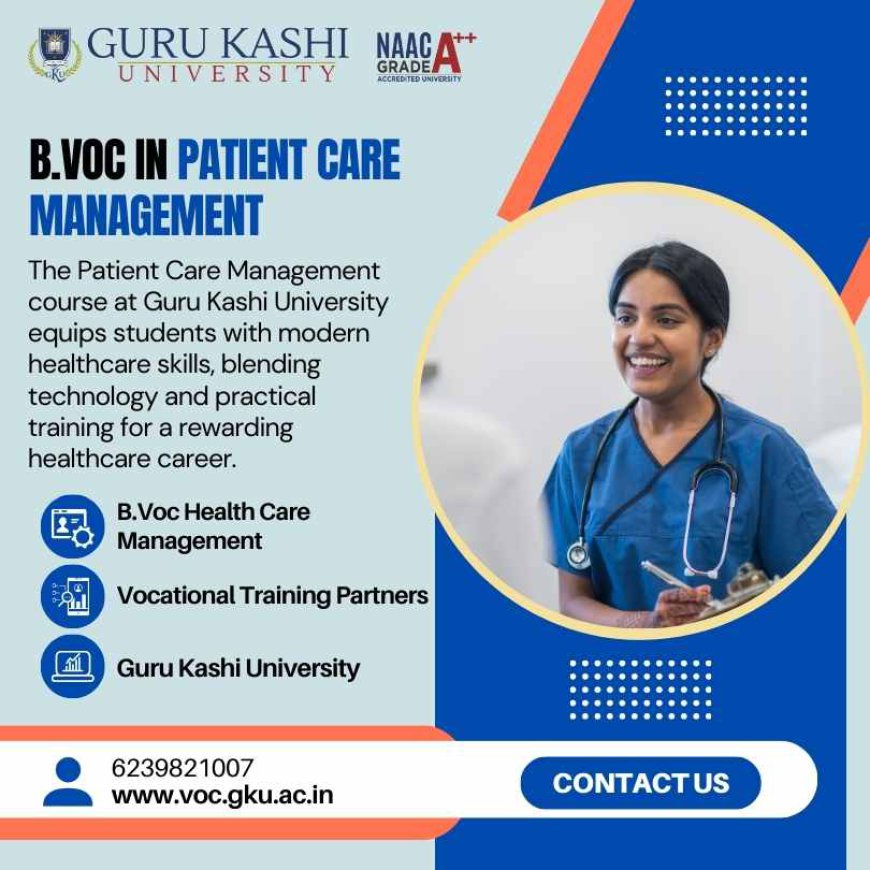What Impact Does Technology Have on Patient Care Management Courses?
Technology plays a transformative role in the Patient Care Management Course, equipping students with the skills to use modern healthcare tools effectively.

Technology has revolutionized education across all fields, including healthcare. Patient care management courses have embraced these advancements to meet the evolving needs of modern healthcare systems. Programs like the B.Voc in Patient Care Management, offered by institutions such as Guru Kashi University, now integrate cutting-edge technological tools to provide students with the skills required to excel in a tech-driven healthcare environment.
This article explores the profound impact of technology on patient care management courses, highlighting its benefits, practical applications, and role in preparing students for the future.
The Integration of Technology in Patient Care Management Courses
1. Blended Learning Approaches
Technology has redefined how educational content is delivered. Modern patient care management courses combine traditional teaching methods with online platforms, offering flexibility and convenience.
- Online Classes: Students can access recorded lectures, interactive modules, and virtual discussions to learn at their own pace.
- E-learning Platforms: These platforms provide digital resources, quizzes, and assessments to enhance understanding.
2. Simulation-Based Training
Hands-on experience is critical in patient care. Technology facilitates simulation-based training, allowing students to practice real-world scenarios without jeopardizing patient safety.
- Virtual Reality (VR): VR tools create realistic environments where students can interact with virtual patients.
- Patient Simulators: These tools mimic real-life medical conditions, enabling students to apply theoretical knowledge practically.
Key Impacts of Technology on Patient Care Management Education
1. Improved Accessibility
Online and hybrid models make patient care management education more accessible, especially for students from remote or underserved areas. Programs like the B.Voc in Patient Care Management leverage digital tools to reach a broader audience.
2. Enhanced Skill Development
Technology introduces students to the latest tools used in healthcare, such as Electronic Health Records (EHR) systems, telemedicine platforms, and wearable health devices. Mastery of these technologies gives students a competitive edge in the job market.
3. Global Exposure
Digital platforms allow students to access global resources, including research papers, case studies, and international webinars. This exposure ensures they are familiar with worldwide best practices in patient care management.
How Technology Enhances Practical Training
1. Electronic Health Records (EHR)
Training in EHR systems is now a fundamental component of patient care management courses. Students learn how to document, analyze, and manage patient data efficiently.
2. Telemedicine
With the rise of telemedicine, students are trained to use tools for remote patient monitoring and virtual consultations. This ensures they can provide care in rural and remote areas.
3. AI and Data Analytics
Artificial Intelligence (AI) and data analytics play a crucial role in healthcare. Courses incorporate training on these technologies, enabling students to predict patient outcomes and make informed decisions.
4. Mobile Health Applications
Patient care management courses now emphasize using mobile apps for patient tracking, medication reminders, and health monitoring. These skills prepare students to implement technology-driven care strategies.
Preparing for Real-World Challenges Through Technology
1. Practical Readiness
Courses like the B.Voc in Patient Care Management use technology to replicate real-world healthcare challenges, preparing students for emergencies, patient communication, and teamwork.
2. Decision-Making Skills
Simulation tools and case studies help students practice critical thinking and problem-solving, essential for effective patient care management.
3. Efficiency in Healthcare
Students trained with advanced technologies can streamline healthcare processes, reducing errors and improving patient outcomes.
The Role of Guru Kashi University and Vocational Training Partners
1. Cutting-Edge Curriculum
Guru Kashi University incorporates the latest technological tools in its B.Voc in Patient Care Management curriculum. From telemedicine training to AI applications, the course ensures students are industry-ready.
2. Hands-On Training
The university collaborates with vocational training partners to provide practical exposure in healthcare settings equipped with modern technology.
3. Skill Development Programs
Guru Kashi University works with skill development training partners to offer certifications in technologies like EHR, telehealth, and wearable devices. These credentials boost employability and career prospects.
4. Vocational Training Courses
Students benefit from vocational courses that focus on specific skills required in patient care management, such as handling medical equipment and using health informatics tools.
Challenges in Implementing Technology in Education
1. Cost
Advanced tools like simulators and VR systems are expensive, which can increase course fees. Institutions like Guru Kashi University offset these costs by offering scholarships and grants.
2. Learning Curve
Students and educators may require additional training to use new technologies effectively. Patient care management courses include introductory modules to address this challenge.
Read Also: What Are the Key Benefits of Pursuing a B.Voc in Healthcare Management?
The Future of Technology in Patient Care Management
As technology continues to evolve, the scope of patient care management education will expand to include innovations like:
-
Blockchain for Healthcare Data Security
Students will learn to secure patient data using blockchain technology. -
Advanced Robotics in Healthcare
Courses will introduce training in robotics for surgical assistance and rehabilitation. -
Wearable Health Tech Integration
Future courses will emphasize using wearable devices to monitor patient health in real time.
Institutions like Guru Kashi University will stay at the forefront of these advancements, ensuring students are well-prepared for future challenges.
Conclusion
Technology has transformed patient care management courses by enhancing accessibility, skill development, and practical training. Programs like the B.Voc in Patient Care Management offered by Guru Kashi University are designed to integrate technological tools and methodologies, ensuring students are equipped for a tech-driven healthcare landscape.
Through partnerships with vocational training partners these programs prepare students to address real-world challenges and excel in their careers. By embracing technology, patient care management education is not only keeping pace with the evolving industry but also shaping its future.
